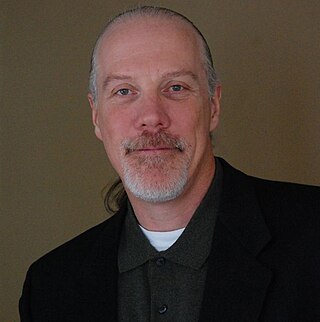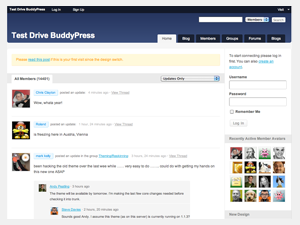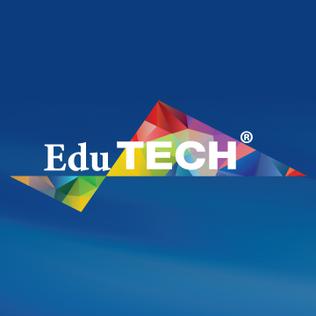
A blog is an informational website consisting of discrete, often informal diary-style text entries (posts). Posts are typically displayed in reverse chronological order so that the most recent post appears first, at the top of the web page. In the 2000s, blogs were often the work of a single individual, occasionally of a small group, and often covered a single subject or topic. In the 2010s, "multi-author blogs" (MABs) emerged, featuring the writing of multiple authors and sometimes professionally edited. MABs from newspapers, other media outlets, universities, think tanks, advocacy groups, and similar institutions account for an increasing quantity of blog traffic. The rise of Twitter and other "microblogging" systems helps integrate MABs and single-author blogs into the news media. Blog can also be used as a verb, meaning to maintain or add content to a blog.

English as a second or foreign language refers to the use of English by individuals whose native language is different, commonly among students learning to speak and write English. Variably known as English as a foreign language (EFL), English as a second language (ESL), English for speakers of other languages (ESOL), English as an additional language (EAL), or English as a new language (ENL), these terms denote the study of English in environments where it is not the dominant language. Programs such as ESL are designed as academic courses to instruct non-native speakers in English proficiency, encompassing both learning in English-speaking nations and abroad.

Free and Open source Software Developers' European Meeting (FOSDEM) is a non-commercial, volunteer-organized European event centered on free and open-source software development. It is aimed at developers and anyone interested in the free and open-source software movement. It aims to enable developers to meet and to promote the awareness and use of free and open-source software.

Stephen Downes is a Canadian philosopher and commentator in the fields of online learning and new media. He has explored and promoted the educational use of computer and online technologies since 1995. He gave the 2004 Buntine Oration and was a presenter at the February 2007 Online Connectivism Conference. In 2008, Downes and George Siemens designed and taught an online, open course reported as a "landmark in the small but growing push toward 'open teaching'" - widely considered the first massive open online course (MOOC).

Student voice is the individual and collective perspective and actions of students within the context of learning and education. It is identified in schools as both a metaphorical practice and as a pragmatic concern. Tech educator Dennis Harper noted that student voice gives students "the ability to influence learning to include policies, programs, contexts and principles."
An edublog is a blog created for educational purposes. Edublogs archive and support [[dibu] and teacher learning by facilitating reflection, questioning by self and others, collaboration and by providing contexts for engaging in higher-order thinking. Edublogs proliferated when blogging architecture became more simplified and teachers perceived the instructional potential of blogs as an online resource. The use of blogs has become popular in education institutions including public schools and colleges. Blogs can be useful tools for sharing information and tips among co-workers, providing information for students, or keeping in contact with parents. Common examples include blogs written by or for teachers, blogs maintained for the purpose of classroom instruction, or blogs written about educational policy. Educators who blog are sometimes called edubloggers.

Will Richardson is an author and speaker on educational technology. He has many published works, including the book, Blogs, Wikis, Podcasts, and other Powerful Web Tools for Classrooms, and the edublog Weblogg-ed which he wrote from 2001 to 2011. Richardson is also active on the web; he has both a Twitter account and YouTube channel.
Linda Marie Harasim, is a "leading teacher, scholar and speaker on the theories and practices of online education, contributing knowledge, technologies, and practices to the field of technology-enabled learning," is a pioneer leading theorist of online education. She is a professor emerita in the School of Communication at Simon Fraser University (SFU) in Vancouver, British Columbia, Canada. Her six books and hundreds of articles about Computer-supported collaborative learning have been acknowledged as seminal works in the field.
Sue Gordon is an Aboriginal retired magistrate from Western Australia who has been locally and nationally honoured for her work with Aboriginal people and in community affairs. She is known for being chair of the Gordon Inquiry in 2002.

BuddyPress is an open-source social networking software package owned by Automattic since 2008. It is a plugin that can be installed on WordPress to transform it into a social network platform. BuddyPress is designed to allow schools, companies, sports teams, or any other niche community to start their own social network or communication tool.
The Institute for Dynamic Educational Advancement (IDEA.org) is a U.S.-based nonprofit organization working in the area of scientific and cultural literacy. The organization was established in 1998 and incorporated in 2002, and has collaborated with museums, schools, nonprofit organizations, and public service projects.
A virtual school library is a PreK-12 library that is a subunit of a virtual school—using the same telecommunications network to provide equitable access to electronic resources and communication designed to support the school's curriculum.

BigBlueButton is a virtual classroom software program designed for online education. It is accessed through Learning Management Systems, providing engagement tools and analytics which enable educators to interact with their students remotely. BigBlueButton is open source, except for some versions of its database software.
The CUNY Academic Commons is an online, academic social network for community members of the City University of New York (CUNY) system. Designed to foster conversation, collaboration, and connections among the 24 individual colleges that make up the university system, the site, founded in 2009, has quickly grown as a hub for the CUNY community, serving in the process to strengthen a growing group of digital scholars, teachers, and open-source projects at the university.

Paul Kim is currently a Korean-American Chief Technology Officer and Associate Dean at the Stanford Graduate School of Education and has held this position since 2001.
S. Craig Watkins is an American professor at the University of Texas at Austin and a media professional involved primarily with interactions between youth culture and the digital age. His research explores connections between race, culture, and education, as well as how certain aspects of media are affecting young adults. He has spoken at many American universities, and has been a guest on National Public Radio as well as a speaker at media conferences across the country.

EduTECH is an annual two-day education and ed-tech conference and trade show launched in Australia in 2011 by Craig Macfarlane, co-founder of Association & Communications Events (ACEvents). ACEvents and the EduTECH brand was subsequently acquired by Terrapinn Limited in 2015. EduTECH brings together over 10,000 educators from pre-schools, schools, universities, vocational education, training organisations and corporate trainers, as well as Government education departments and a myriad of education products and solution providers, to discuss latest education trends and methods, and to find ways to improve teaching and learning. EduTECH is well known to be the largest education event in the Southern Hemisphere and APAC region. The conference is held annually between June - August. In 2023, EduTECH will run at the Melbourne Convention and Exhibition Centre on 24 and 25 August 2023. Previous events ran at the International Convention Centre Sydney by Terrapinn Ltd.
Virtual exchange is an instructional approach or practice for language learning. It broadly refers to the "notion of 'connecting' language learners in pedagogically structured interaction and collaboration" through computer-mediated communication for the purpose of improving their language skills, intercultural communicative competence, and digital literacies. Although it proliferated with the advance of the internet and Web 2.0 technologies in the 1990s, its roots can be traced to learning networks pioneered by Célestin Freinet in 1920s and, according to Dooly, even earlier in Jardine's work with collaborative writing at the University of Glasgow at the end of the 17th to the early 18th century.

Educational management refers to the administration of the education system in which a group combines human and material resources to supervise, plan, strategise, and implement structures to execute an education system. Education is the equipping of knowledge, skills, values, beliefs, habits, and attitudes with learning experiences. The education system is an ecosystem of professionals in educational institutions, such as government ministries, unions, statutory boards, agencies, and schools. The education system consists of political heads, principals, teaching staff, non-teaching staff, administrative personnel and other educational professionals working together to enrich and enhance. At all levels of the educational ecosystem, management is required; management involves the planning, organising, implementation, review, evaluation, and integration of an institution. Research in educational management should explore the dynamic interplay among educational leaders, their followers, and the broader community to enhance the quality of teaching and learning outcomes.
AusCERT is a non-profit organisation founded in 1993 that provides advice, education and solutions to cybersecurity threats and vulnerabilities.










